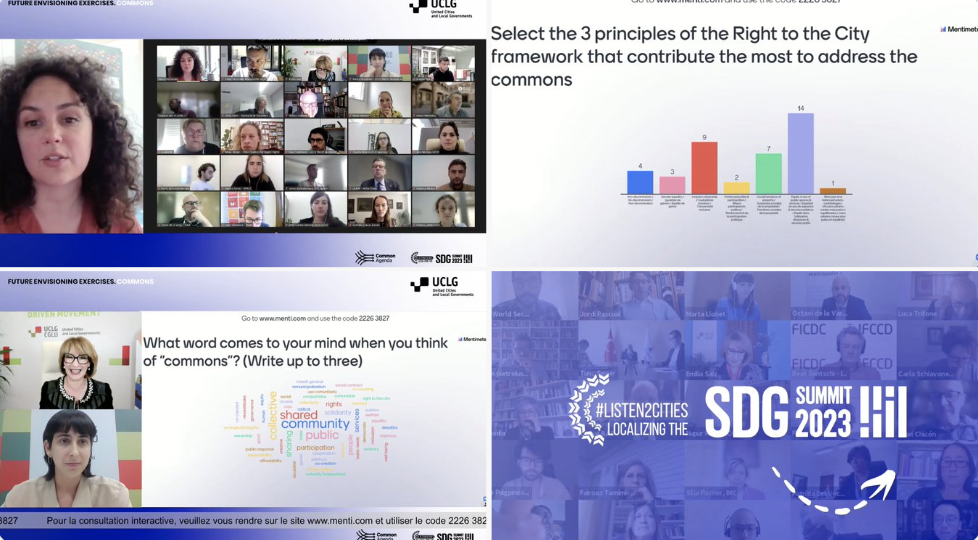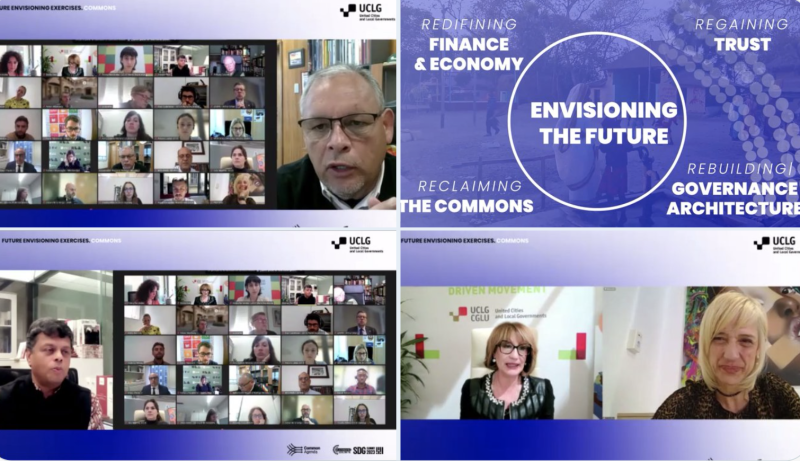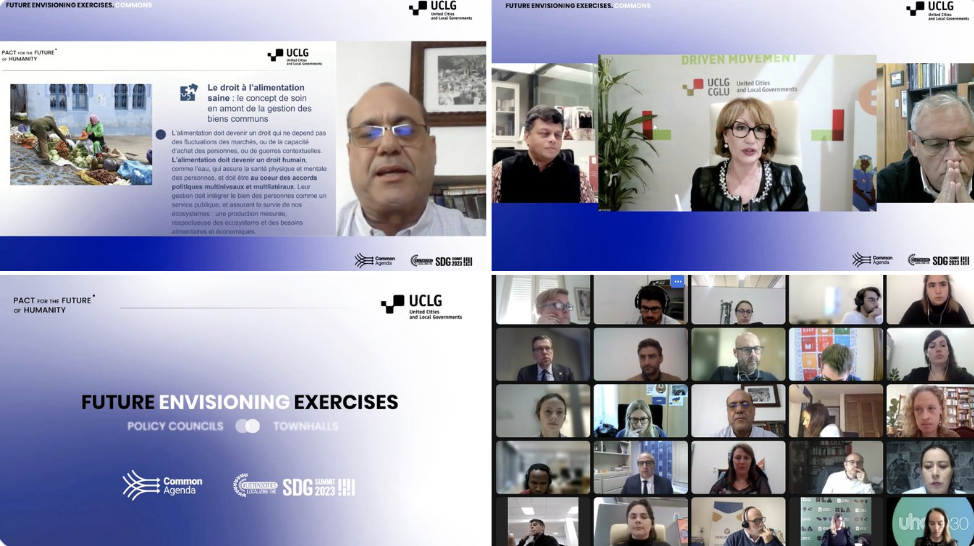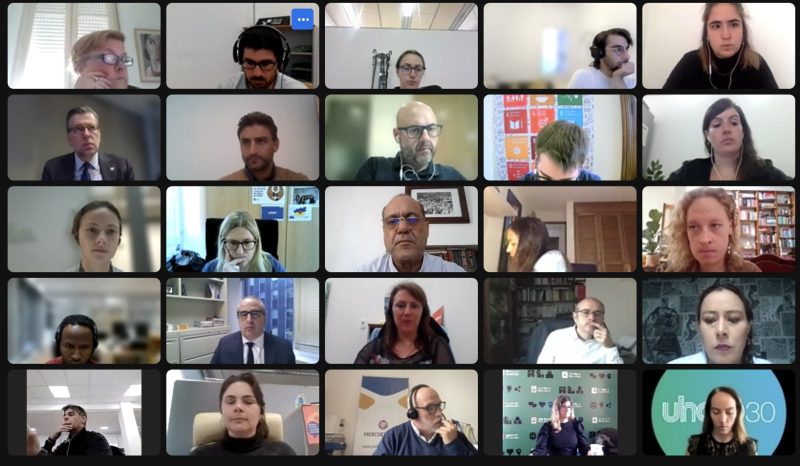Press Release FEE: The Transforming Power of the Commons for a Sustainable Future
05.05.2023
UCLG’s Future Envisioning Exercises, which serve as a means to unfold the Pact for the Future, have been initiated by the UCLG Policy Councils. They are a space of dialogue and co-creation in which the UCLG political leadership, together with organized civil society and partners articulated in the UCLG Town Halls will build bridges to unfold the Pact.
During this session and the subsequent exercises days the aim is to explore and discuss how the notion and implementation of the Commons, Finance, Trust, and Governance Architecture will contribute to how the Pact for the Future supports the revision of the 2030 Agenda by the UN General Assembly at the SDG Summit and the 2024 Summit of the Future, which will align with and support the Secretary-General’s “Our Common Agenda.”
Methodology of the Session
The exercise was introduced by UCLG Secretary-General Emilia Saiz, who presented the entire exercise as not “one single discussion but part of a policy-making mechanism that UCLG is deploying with the elected officials, civil society organizations and academia”.
The section was structured into several segments: it began with a virtual consultation introduced by UCLG, which was based around on what participants understand by the Commons and its relation to the right to the city, followed by the concrete contributions on the concept and its applications at the territorial level from UCLG policy councillors, representatives of the UCLG Town Halls and stakeholders followed this introductory segment. An in-focus segment allowed for partner organizations to express their understanding of common goods and the relationship with local and regional governments.
Participants delivered their vision of the Commons and concrete communing policies and practices before arriving to the Agora, the open dialogue space, that allowed for sharing ideas and bringing together innovative policies that will be a part of the vision document of the exercise.

The Commons as an entry point to the Pact for the Future

Aromar Revi, the Director of the Indian Institute for Human Settlements and UCLG UBUNTU advisor was the entry point of the exercise, and Rodrigo Mundaca, Governor of Valparaíso, who laid the case for the management of water as a common good and the struggles and opportunities that ensue.
“The Commons is not just a question of private-public, if we want to think about commons we need to think about the most important common resources of humanity: demographic changes , time, and how we allocate it. We also need to rethink our concept of property, and reconstructing the idea of place, of relocating where we are and making sure people access the commons.” Aromar Revi UCLG UBUNTU Advisor, Director of the Indian Institute for Human Settlements.
“The Common is that from which life depends on. It is the opposite of that which is private. Commoning needs to be about returning to common hands that which has been taken from them. Water is an example of a common good that needs to be decolonized, one that is not a resource, but a source of life” Rodrigo Mundaca, Governor of Valparaíso.
High-Impact Contributions – Commitments to transformation
The Future Envisioning Exercise on the Commons featured discussions on critical issues such as time, how we deal with the planet as a common, and the connection between life, resources, and human society.
Pilar Diaz, Deputy of the Presidency for the Barcelona Provincial Council, brought to the table the importance of international alliances and of making the power of feminist municipalism flourish, in order to favour exchanges of experiences and define shared actions in favour of gender equality.
Universal health coverage was presented as a milestone in regards to governing commons by Gabriela Cuevas, from the UHC2030 Steering Committee, who relaid the importance of delivering common goods for health and the role that needs to be played by all spheres of government to uphold universal health commitments.. Health, she argued, is an investment that needs to be prioritized to protect the planet. She noted that we cannot continue living in a world where half the population is denied access to health services, and a focus needs to be on people, who must have a say in the policies and programs to address their needs.
Other topics discussed at the Future Envisioning Exercise included a call to ensure that food becomes a human right by Mayor of Chefchaouen and UCLG Special Envoy on Food Systems Mohamed Sefiani. The exercise also explored the model of local and international development for equitable and non-speculative distribution, as well as local policies that promote the notion of loss and damage at the core of the political and economic domain.
Arthur Erken, Director of Policy and Strategy of the United Nations Population Fund, highlighted that the growing urban population needs to be considered when discussing the commons, including how we are able to create liveable conditions for citizens. He emphasized the importance of the task that UCLG and UNFPA need to undertake to take demographics into account to impulse the transformations that are needed, especially when it comes to challenges such as gender equality, climate change.

The Agora: Local voices to advance the governance of the Commons

Lorena Zárate, Co-founder of the Global Platform for the Right to the City, introduced the open floor “Agora” segment, stressing the need for a joint strategy between local and regional governments and civil society organizations, building on the joint work developed during the Town Hall process.
Sophia Torres, Global Platform for the Right to the City, moderated the open floor Agora and drew the connections between caring societies and the right to the city .
The Agora highlighted the importance of advancing governance to reclaim the commons, and participants stressed the need to ensure the voices of the marginalized and vulnerable are heard to guarantee an inclusive future. Throughout the discussion, participants called on the need to develop social protection to cover the diversity of inhabitants that live in cities, including those providing care, many of which live and work informally.
The ensuing discussion emphasized the critical role of commons and care in promoting social cohesion, mental health, and equality, and the need for multilateral governance and feminist education to bring about societal change. Biodiversity as a common good was introduced during this segment, building on the concept of water and food as global common goods, with its protection being seen a s a key component to return planetary balance and a wake-up call to include common goods in global development agendas.
The UCLG Future Envisioning Exercise wrapped up with the commitment to continue the conversation around the commons,which will be critical towards policy implementation. The upcoming Future Envisioning Exercises will take place from the 5th to the 11th of May, with a specific focus on Finance; Trust, and Governance Architecture.